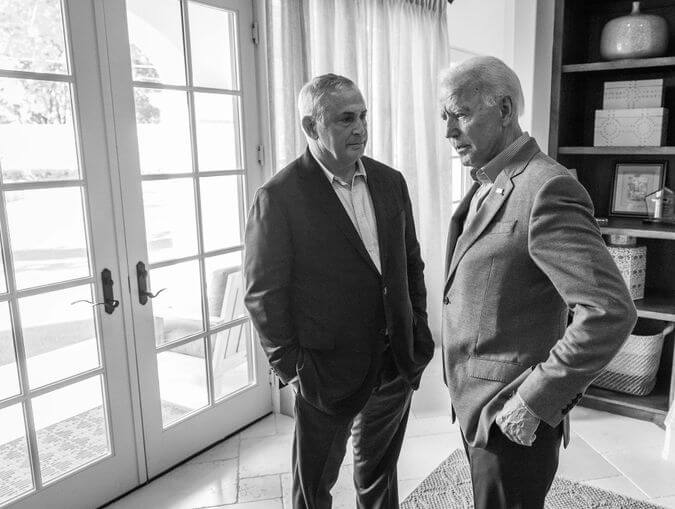Never before had anyone affixed a mezuzah to the doorpost of the Bosch Palace, the historic Buenos Aires residence of the American ambassador to Argentina.
Marc Stanley did it (and called it a “Bosch mitzvah”) after another first — his swearing-in as ambassador, the year anniversary of which is on Sunday. Never before had a Jewish person served in the post.
In a recent interview, Stanley said he takes pride in that fact and that the reception in Argentina has been “incredibly warm and embracing.”
Since Stanley was confirmed by the U.S. Senate, he has brought a particularly Jewish sensibility to the job, one that recognizes Jewish but also other religious minorities. He is the first American ambassador to Argentina to not only host a Seder but an Iftar dinner, the evening meal with which Muslim break their daily Ramadan fast.
He also was the first ambassador to visit Moisés Ville, the first rural Jewish settlement to be established in the country, which he described as one of the most moving experiences of the past year. The small town in the province of Santa Fe was founded in 1889 by Eastern European and Russian Jews escaping persecution. They built synagogues, schools and became a center of Jewish culture now recognized by the United Nations Educational, Scientific and Cultural Organization (UNESCO) as an international heritage site.
Stanley, 65, has sought to highlight Argentina’s Jewish history — and its responsibilities to root out antisemitism — in other ways. He had a joint aliyah earlier this year, with Ambassador Deborah E. Lipstadt, the U.S. envoy to combat and monitor antisemitism, at the Bet Hillel synagogue in Buenos Aires.
The road to Buenos Aires
Stanley’s interest in government, politics and Jewish community affairs goes back decades. As a George Washington University college student, he served as an intern in the House of Representatives and created the body’s first telephone directory, which he edited until he graduated.
A longtime Dallas trial lawyer, Stanley was an early supporter of Joe Biden’s bid for president and chaired “Lawyers for Biden,” recruiting thousands of attorneys to donate money and legal services.
He is a past chairman of the National Jewish Democratic Council, a co-founder of the Jewish Democratic Council of America and served as a council member of the United States Holocaust Memorial Museum.
He also donated a kidney to an ill Dallas rabbi in 2014.
 Marc Stanley with Joe Biden on Sept. 14, 2019 Photo by Marc Stanley/Facebook
Marc Stanley with Joe Biden on Sept. 14, 2019 Photo by Marc Stanley/Facebook
In late 2020, during the last month’s of the presidential race, Stanley suffered a head injury while riding an electric bike on vacation in Park City, Utah. Doctors, family and friends worried that physically and mentally, he might never be the same. But after being stabilized and undergoing reconstructive facial surgery he made what many deemed a miraculous recovery.
Stanley, who speaks Spanish, said he expressed an interest in serving as ambassador to Argentina following Biden’s victory because the country has the world’s sixth-largest Jewish population, estimated at 180,000 according to a 2022 report. Most of the nation’s Jews live in the Buenos Aires area. “I had been here before and I was in love with the country,” he said, adding that he has friends and relatives living there.
He was nominated last August and the Senate confirmed him three months later.
Remembering the AMIA bombing
Stanley has also as ambassador focused attention on the 1994 bombing of the Israeli embassy and the AMIA Jewish center in Buenos Aires, which killed 85 people, and the death of the federal prosecutor, Alberto Nisman, in 2015.
He said he was “distressed by the lack of justice” in the case.
He wants Argentinian lawmakers to allow for the prosecution of a suspect in absentia, so that those responsible are no longer beyond the arm of the law.
Nisman was found dead in 2015 the day before he was going to implicate Argentina’s then president, Cristina Fernández de Kirchner, and other government officials, for trying to protect the Iranian operatives behind the bombing. Her administration suggested he killed himself. Police called it a homicide.
Stanley brags that he was the first to write to Lipstadt’s State Department email account after her confirmation, to ask her to attend the Latin Jewish Conference’s July conference on antisemitism. She accepted.
Bilateral relations
Looking back on the year, Stanley said he has strengthened the U.S.-Argentinian relationship, particularly in the context of Russia’s war against Ukraine.
The conflict has threatened global supplies of wheat, oil and other commodities. Stanley points out that Argentina has the second-largest shale oil and gas deposits in the world, the third-largest lithium deposits, and is in the top five exporting wheat, corn and soy.
“I think that has presented sort of a lane for me to work in,” he said, bringing the U.S. and allies to invest in the infrastructure to ramp up production “to feed the world and fuel the world.”
The post A mezuzah on the ambassador’s doorpost: The first Jew in the job reflects on a year in Argentina appeared first on The Forward.

